First archaeological experiment in space
Tuesday, 18 January 2022 11:20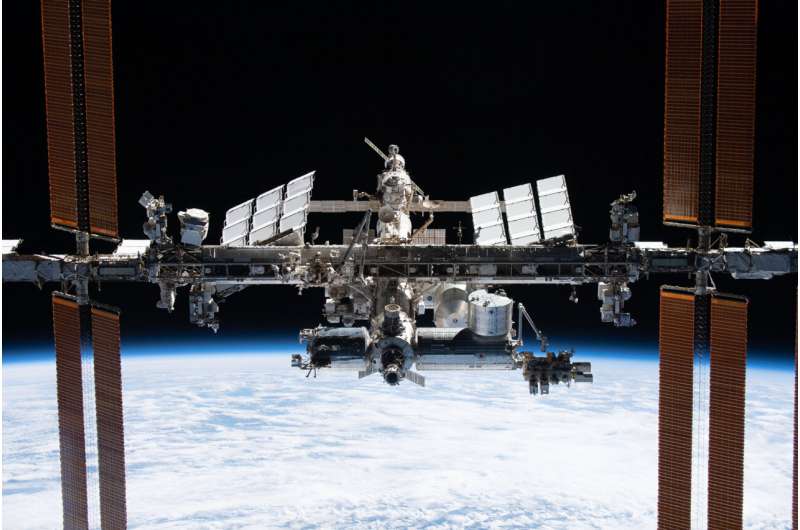
A world-first—or solar-system-first—archaeological project has this week begun on the International Space Station.
Led by archaeologists Associate Professor Alice Gorman from Flinders University and Associate Professor Justin Walsh of Chapman University in California, the International Space Station Archaeological Project (ISSAP) is the first archaeological study of a space habitat.
"We're the first to try to understand how humans relate to the items they live with in space," says Associate Professor Walsh.
"By bringing archaeological perspectives to an active space domain, we're the first to show how people adapt their behaviour to a completely new environment."
The team's first project, Sampling Quadrangle Assemblages Research Experiment, or SQuARE, has now launched, with an experiment that creatively imagines for space the most basic technique for sampling an archaeological site: the test pit.
While earth-bound archaeologists dig one-meter squares to understand a site and strategize further study, the ISSAP team will use adhesive tape to define one-meter areas of the International Space Station and then use daily photographs to study how the spaces are used.
"Instead of digging them to reveal new layers of soil representing different moments in the site's history, we will have them photographed each day to identify how they're being used and how they change over time," explains Associate Professor Gorman.
ESA Director General's Annual Press Conference
Tuesday, 18 January 2022 09:30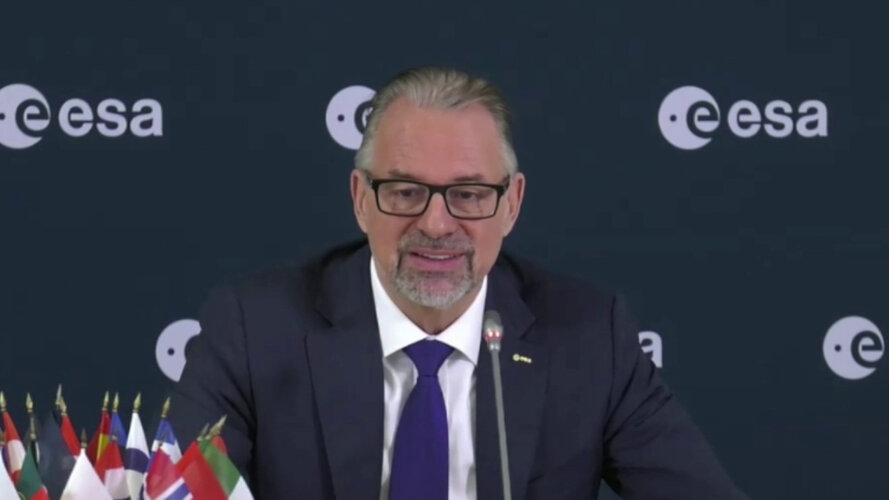 Video:
01:47:29
Video:
01:47:29
Exciting launches to the Moon and to the Red Planet, a second mission to the International Space Station for ESA astronaut Samantha Cristoforetti, the very first images provided by the James Webb Space Telescope, and a new class of European astronauts: 2022 looks very promising for European space!
Watch the replay of our annual press conference with ESA Director General Josef Aschbacher presenting the highlights for 2022. He is joined by ESA Directors and answers questions from journalists.
Bluestaq gets new investor to fund growth in defense and space data management
Tuesday, 18 January 2022 08:00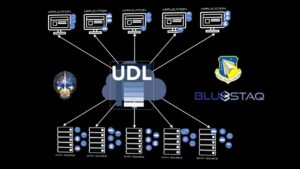
The O’Neil Group, a real estate and asset management company based in Colorado Springs, announced Jan. 18 it is making a strategic investment in Bluestaq, a technology startup that is developing an enterprise data system for the U.S.
Astronaut selection: stage one complete
Tuesday, 18 January 2022 07:05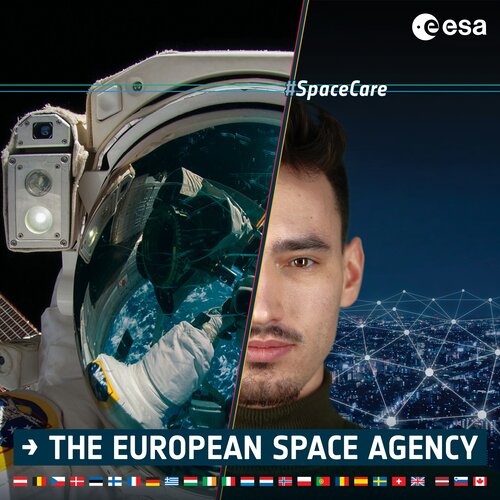
The next stage of ESA’s astronaut selection is underway, with around 1391 applicants invited to a full day of testing at a facility in Europe.
Steady driving towards ExoMars launch
Tuesday, 18 January 2022 07:00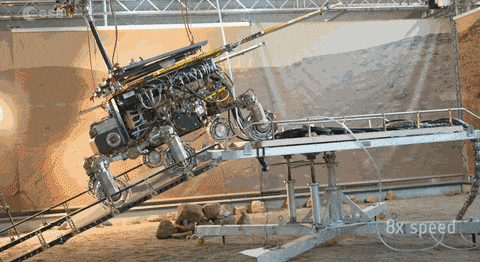
The first simulation of the ExoMars Rosalind Franklin rover driving off its landing platform closed out an incredible year of preparations as the mission now marches with confidence towards a September launch.
quub To Demonstrate Cybersecurity with Smallsat
Tuesday, 18 January 2022 06:02 Scheduled to launch on a SpaceX Falcon 9 rocket on January 13, 2022, quub's pocketqube smallsat will serve as a proof of concept for the prevention of data hacks.
Data breaches cost millions of dollars every year. IBM's annual Data Breach Report indicates that the average worldwide cost per breach in 2020 was $3.86 million. In the U.S., the average cost per breach was $8.64 million.
Scheduled to launch on a SpaceX Falcon 9 rocket on January 13, 2022, quub's pocketqube smallsat will serve as a proof of concept for the prevention of data hacks.
Data breaches cost millions of dollars every year. IBM's annual Data Breach Report indicates that the average worldwide cost per breach in 2020 was $3.86 million. In the U.S., the average cost per breach was $8.64 million. Photon pairs are more sensitive to rotations than single photons
Tuesday, 18 January 2022 06:02 In the field of quantum metrology, scientists are developing novel measurement schemes that benefit from quantum features and are more precise and sensitive than classical conventional methods. The team of researchers from Tampere University, Finland, and the National Research Council of Canada has now shown how a simple and powerful technique called two-photon N00N states can be used to create
In the field of quantum metrology, scientists are developing novel measurement schemes that benefit from quantum features and are more precise and sensitive than classical conventional methods. The team of researchers from Tampere University, Finland, and the National Research Council of Canada has now shown how a simple and powerful technique called two-photon N00N states can be used to create Pebbles before mountains
Tuesday, 18 January 2022 06:02 NASA's Mars 2020 mission team has been working methodically and thoroughly, making good progress on understanding the best path forward to remove the uninvited pebbles from Perseverance's bit carousel. Over the previous weekend, and earlier this week, operational sequences were developed and tested to remove these rocky interlopers.
With terrestrial experimentation complete, we have begun
NASA's Mars 2020 mission team has been working methodically and thoroughly, making good progress on understanding the best path forward to remove the uninvited pebbles from Perseverance's bit carousel. Over the previous weekend, and earlier this week, operational sequences were developed and tested to remove these rocky interlopers.
With terrestrial experimentation complete, we have begun Hubble views a tranquil galaxy with an explosive past
Tuesday, 18 January 2022 06:02 The lazily winding spiral arms of the spectacular galaxy NGC 976 fill the frame of this image from the NASA/ESA Hubble Space Telescope. This spiral galaxy lies around 150 million light-years from the Milky Way in the constellation Aries. Despite its tranquil appearance, NGC 976 has played host to one of the most violent astronomical phenomena known - a supernova explosion.
These cataclysmi
The lazily winding spiral arms of the spectacular galaxy NGC 976 fill the frame of this image from the NASA/ESA Hubble Space Telescope. This spiral galaxy lies around 150 million light-years from the Milky Way in the constellation Aries. Despite its tranquil appearance, NGC 976 has played host to one of the most violent astronomical phenomena known - a supernova explosion.
These cataclysmi Airbus teams with Japan telcos to study connectivity services from high-altitude platforms
Tuesday, 18 January 2022 04:54 Airbus, Nippon Telegraph and Telephone Corporation (NTT), NTT DOCOMO, and SKY Perfect JSAT have jointly begun studying the feasibility of collaborating on future high-altitude platform stations (HAPS)-based connectivity services as part of a future space-based wireless connectivity ecosystem.
Launched with a memorandum of understanding (MOU), the study aims to identify the early deployment
Airbus, Nippon Telegraph and Telephone Corporation (NTT), NTT DOCOMO, and SKY Perfect JSAT have jointly begun studying the feasibility of collaborating on future high-altitude platform stations (HAPS)-based connectivity services as part of a future space-based wireless connectivity ecosystem.
Launched with a memorandum of understanding (MOU), the study aims to identify the early deployment HGC offers ultra-low latency Eyeball-as-a-Service across Asia
Tuesday, 18 January 2022 04:54 HGC Global Communications Limited (HGC), a fully-fledged ICT service provider and network operator with extensive global coverage, and Kacific Broadband Satellites Group (Kacific), a next-generation broadband satellite operator that provides affordable, high-speed broadband access to Asia Pacific, have collaborated to boost critical connectivity across emerging markets in the Philippines, provid
HGC Global Communications Limited (HGC), a fully-fledged ICT service provider and network operator with extensive global coverage, and Kacific Broadband Satellites Group (Kacific), a next-generation broadband satellite operator that provides affordable, high-speed broadband access to Asia Pacific, have collaborated to boost critical connectivity across emerging markets in the Philippines, provid Newly discovered carbon may yield clues to ancient Mars
Tuesday, 18 January 2022 04:54 NASA's Curiosity rover landed on Mars on Aug. 6, 2012, and since then has roamed Gale Crater taking samples and sending the results back home for researchers to interpret. Analysis of carbon isotopes in sediment samples taken from half a dozen exposed locations, including an exposed cliff, leave researchers with three plausible explanations for the carbon's origin - cosmic dust, ultraviolet degr
NASA's Curiosity rover landed on Mars on Aug. 6, 2012, and since then has roamed Gale Crater taking samples and sending the results back home for researchers to interpret. Analysis of carbon isotopes in sediment samples taken from half a dozen exposed locations, including an exposed cliff, leave researchers with three plausible explanations for the carbon's origin - cosmic dust, ultraviolet degr Curiosity measures intriguing carbon signature on Mars
Tuesday, 18 January 2022 04:54 After analyzing powdered rock samples collected from the surface of Mars by NASA's Curiosity rover, scientists have announced that several of the samples are rich in a type of carbon that on Earth is associated with biological processes.
While the finding is intriguing, it doesn't necessarily point to ancient life on Mars, as scientists have not yet found conclusive supporting evidence of
After analyzing powdered rock samples collected from the surface of Mars by NASA's Curiosity rover, scientists have announced that several of the samples are rich in a type of carbon that on Earth is associated with biological processes.
While the finding is intriguing, it doesn't necessarily point to ancient life on Mars, as scientists have not yet found conclusive supporting evidence of New research may help scientists unravel the physics of the solar wind
Tuesday, 18 January 2022 04:54 A new study led by University of Minnesota Twin Cities researchers, using data from NASA's Parker Solar Probe, provides insight into what generates and accelerates the solar wind, a stream of charged particles released from the sun's corona. Understanding how the solar wind works can help scientists predict "space weather," or the response to solar activity-such as solar flares-that can impact b
A new study led by University of Minnesota Twin Cities researchers, using data from NASA's Parker Solar Probe, provides insight into what generates and accelerates the solar wind, a stream of charged particles released from the sun's corona. Understanding how the solar wind works can help scientists predict "space weather," or the response to solar activity-such as solar flares-that can impact b Chinese scientists build 'Artificial Moon' to conduct experiments in low gravity
Tuesday, 18 January 2022 04:54 According to the South China Morning Post, the facility located in Jiangsu Province, will play an important part in the exploration of the Moon as China plans to land its astronauts on Earth's satellite by 2030 and set up a base there.
Chinese scientists have built an artificial moon that will make it possible to conduct experiments in low gravity. According to the researchers, their creat
According to the South China Morning Post, the facility located in Jiangsu Province, will play an important part in the exploration of the Moon as China plans to land its astronauts on Earth's satellite by 2030 and set up a base there.
Chinese scientists have built an artificial moon that will make it possible to conduct experiments in low gravity. According to the researchers, their creat 